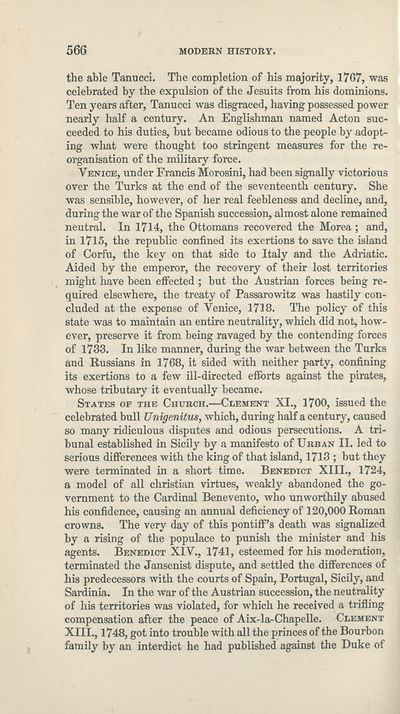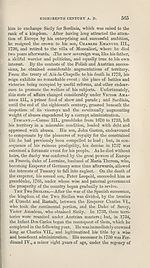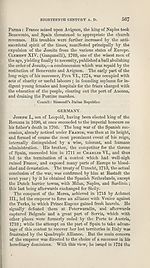Download files
Complete book:
Individual page:
Thumbnail gallery: Grid view | List view

566
MODERN HISTORY.
the able Tanucci. The completion of his majority, 1767, was
celebrated by the expulsion of the Jesuits from his dominions.
Ten years after, Tanucci was disgraced, having possessed power
nearly half a century. An Englishman named Acton suc¬
ceeded to his duties, but became odious to the people by adopt¬
ing what were thought too stringent measures for the re¬
organisation of the military force.
Venice, under Francis Morosini, had been signally victorious
over the Turks at the end of the seventeenth century. She
was sensible, however, of her real feebleness and decline, and,
during the war of the Spanish succession, almost alone remained
neutral. In 1714, the Ottomans recovered the Morea ; and,
in 1715, the republic confined its exertions to save the island
of Corfu, the key on that side to Italy and the Adriatic.
Aided by the emperor, the recovery of their lost territories
might have been effected ; but the Austrian forces being re¬
quired elsewhere, the treaty of Passarowitz was hastily con¬
cluded at the expense of Venice, 1718. The policy of this
state was to maintain an entire neutrality, which did not, how¬
ever, preserve it from being ravaged by the contending forces
of 1733. In like manner, during the war between the Turks
and Russians in 1768, it sided with neither party, confining
its exertions to a few ill-directed efforts against the pirates,
whose tributary it eventually became.
States of the Church.—Clement XI., 1700, issued the
celebrated bull Unigenitus, which, during half a century, caused
so many ridiculous disputes and odious persecutions. A tri¬
bunal established in Sicily by a manifesto of Urban II. led to
serious difierences with the king of that island, 1713 ; but they
were terminated in a short time. Benedict XIII., 1724,
a model of all Christian virtues, weakly abandoned the go¬
vernment to the Cardinal Benevento, who unworthily abused
his confidence, causing an annual deficiency of 120,000 Roman
crowns. The very day of this pontiff’s death was signalized
by a rising of the populace to punish the minister and his
agents. Benedict XIV., 1741, esteemed for his moderation,
terminated the Jansenist dispute, and settled the differences of
his predecessors with the courts of Spain, Portugal, Sicily, and
Sardinia. In the war of the Austrian succession, the neutrality
of his territories was violated, for which he received a trifling
compensation after the peace of Aix-la-Chapelle. Clement
XIII., 1748, got into trouble with all the princes of the Bourbon
family by an interdict he had published against the Duke of
MODERN HISTORY.
the able Tanucci. The completion of his majority, 1767, was
celebrated by the expulsion of the Jesuits from his dominions.
Ten years after, Tanucci was disgraced, having possessed power
nearly half a century. An Englishman named Acton suc¬
ceeded to his duties, but became odious to the people by adopt¬
ing what were thought too stringent measures for the re¬
organisation of the military force.
Venice, under Francis Morosini, had been signally victorious
over the Turks at the end of the seventeenth century. She
was sensible, however, of her real feebleness and decline, and,
during the war of the Spanish succession, almost alone remained
neutral. In 1714, the Ottomans recovered the Morea ; and,
in 1715, the republic confined its exertions to save the island
of Corfu, the key on that side to Italy and the Adriatic.
Aided by the emperor, the recovery of their lost territories
might have been effected ; but the Austrian forces being re¬
quired elsewhere, the treaty of Passarowitz was hastily con¬
cluded at the expense of Venice, 1718. The policy of this
state was to maintain an entire neutrality, which did not, how¬
ever, preserve it from being ravaged by the contending forces
of 1733. In like manner, during the war between the Turks
and Russians in 1768, it sided with neither party, confining
its exertions to a few ill-directed efforts against the pirates,
whose tributary it eventually became.
States of the Church.—Clement XI., 1700, issued the
celebrated bull Unigenitus, which, during half a century, caused
so many ridiculous disputes and odious persecutions. A tri¬
bunal established in Sicily by a manifesto of Urban II. led to
serious difierences with the king of that island, 1713 ; but they
were terminated in a short time. Benedict XIII., 1724,
a model of all Christian virtues, weakly abandoned the go¬
vernment to the Cardinal Benevento, who unworthily abused
his confidence, causing an annual deficiency of 120,000 Roman
crowns. The very day of this pontiff’s death was signalized
by a rising of the populace to punish the minister and his
agents. Benedict XIV., 1741, esteemed for his moderation,
terminated the Jansenist dispute, and settled the differences of
his predecessors with the courts of Spain, Portugal, Sicily, and
Sardinia. In the war of the Austrian succession, the neutrality
of his territories was violated, for which he received a trifling
compensation after the peace of Aix-la-Chapelle. Clement
XIII., 1748, got into trouble with all the princes of the Bourbon
family by an interdict he had published against the Duke of
Set display mode to:
![]() Universal Viewer |
Universal Viewer | ![]() Mirador |
Large image | Transcription
Mirador |
Large image | Transcription
| Antiquarian books of Scotland > Education > Elements of universal history on a new and systematic plan > (586) |
|---|
| Permanent URL | https://digital.nls.uk/127587172 |
|---|
| Description | Thousands of printed books from the Antiquarian Books of Scotland collection which dates from 1641 to the 1980s. The collection consists of 14,800 books which were published in Scotland or have a Scottish connection, e.g. through the author, printer or owner. Subjects covered include sport, education, diseases, adventure, occupations, Jacobites, politics and religion. Among the 29 languages represented are English, Gaelic, Italian, French, Russian and Swedish. |
|---|

